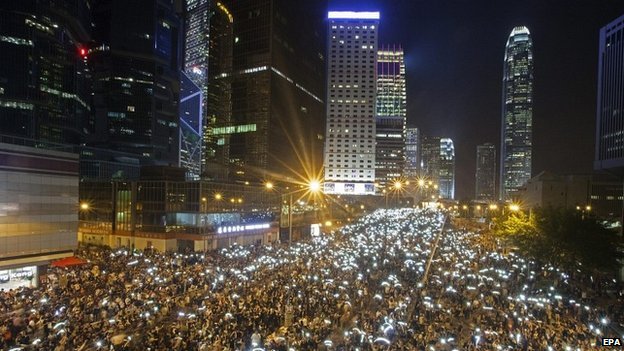Support for the democracy movement in Hong Kong is growing, with protests and student boycotts taking place across the city. The outrage was sparked when Beijing announced it would pre-screen candidates for the chief executive election in 2017, allowing the Hong Kong public to vote between two or three finalists selected by Beijing. Many believe this contravenes Hong Kong’s right to democracy under the “one country, two systems” policy put in place when Britain passed control of Hong Kong to China in 1997.
The “one country, two systems” policy was set up to ensure that Hong Kong would have its own legal system and rights to freedom of speech, and that freedom of assembly would be protected under the ruling, which is valid for 50 years. However, a recent Beijing White Paper stressed that Hong Kong does not have full autonomy from China and says it is still under Beijing control. This has led to an outcry from pro-democracy supporters in Hong Kong, led by the organisation Occupy Central.
Occupy Central organised an unofficial political referendum in June, which led to a pro-democracy rally with an estimated turnout of over 150,000. Leaders of the Occupy Central movement have admitted that support for the movement is unlikely to sway the Chinese government, but say that public protests cement peoples’ rights to free speech and the right to protest, rights which those in mainland China do not have. During the rally, police arrested 500 peaceful protesters, a move which Amnesty International describes as “disturbing”. Student groups are boycotting classes, with up to 13,000 students taking part in individual boycotts.
China maintains that it will select candidates for the election, commenting that openly nominating candidates would create a “chaotic society”.
British ex-governor of Hong Kong, Chris Patten, has commented that Britain has a “moral obligation” to speak up for democracy in Hong Kong, and not fear “commercial consequences when our honour is on the line”. The UK has called for the right to protest to be protected.
The protests are escalating with tens of thousands in the streets and the Chinese authorities insisting that the protests are illegal.
Since Monday September, 29 protest numbers have escalated, taking over the Central district as well as the shopping districts of Causeway Bay and Mongkok. Protesters in the streets despite the heavy rain, causing the movement to be called the “Umbrella Revolution”. Police used pepper spray and batons, although their presence remains light and protests were predominately peaceful. However after some escalation on Friday clashes broke out as people apparently angry with the disruption caused by the protests tried to dismantle tents and barricades, 19 people have been arrested.






 Print
Print Email
Email